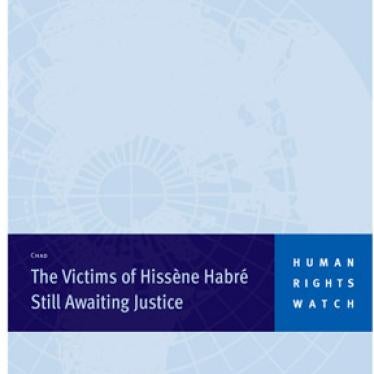Human Rights Watch thanks the Senate Judiciary Committee for the opportunity to submit this statement for the record for its hearing “Holding Russian Kleptocrats and Human Rights Violators Accountable for Their Crimes Against Ukraine.”
Human Rights Watch investigates and reports on violations of international human rights and international humanitarian law by states and non-state armed groups in about 100 countries around the world. Our staff is comprised of approximately 600 people from over 80 countries who are country experts, lawyers, journalists, and others who work to protect those most at risk, including civilians in wartime.
The Need for Justice in Ukraine and Beyond
The armed conflict in Ukraine since Russia’s full-scale invasion on February 24, 2022, has been disastrous for the civilian population. Russian forces have committed numerous violations of international humanitarian law, including indiscriminate and disproportionate bombing and shelling of populated areas. Many attacks have been with explosive weapons with wide area effects, including cluster munitions, unguided aerial bombs, and guided missiles.
In areas they occupied, Russian or Russia-affiliated forces have committed apparent war crimes and potential crimes against humanity, including summary executions, torture, sexual violence, enforced disappearances, and the pillage of art and cultural artifacts. Civilians who attempted to flee areas of fighting faced terrifying ordeals and numerous obstacles. In some cases, Russian forces forcibly transferred significant numbers of Ukrainian civilians to Russia or Russian-occupied areas of Ukraine, which is a war crime. Both Russian and Ukrainian forces have used banned antipersonnel landmines. A recent United Nations report found that both forces have been responsible for apparent summary executions and mistreatment of prisoners of war.
Serious violations of international humanitarian law committed with criminal intent—that is, deliberately or recklessly—are war crimes.
Ukrainian authorities have been conducting their own criminal investigations. To support these efforts, many governments, including the United States, have offered Ukraine assistance to bolster its judicial capacity and have coordinated their efforts to that end.
The International Criminal Court (ICC) opened an investigation in Ukraine in March 2022; the investigation has so far yielded two arrest warrants, for Russian President Vladimir Putin and the children’s rights commissioner in his office, Maria Lvova-Belova. ICC judges found reasonable grounds to believe that Putin and Lvova-Belova bear criminal responsibility for the alleged unlawful deportation and transfer of Ukrainian children from occupied areas of Ukraine to Russia.
In addition to the ICC’s ongoing investigation, governments and others have initiated various accountability efforts to address serious crimes in Ukraine. Judicial officials in the United States and in several other countries have opened criminal investigations. The UN Human Rights Council voted in March 2022 to establish an international Commission of Inquiry to document war crimes and human rights abuses in Ukraine.
During the past year, these efforts by international bodies and governments have shown the value of developing a multilayered approach to providing impartial and credible justice for Ukraine. However, without effective coordination, there could be significant duplication of efforts and waste of financial and human resources with limited impact for victims and survivors.
In addition, the swift international response to the crimes committed in Ukraine puts into sharp focus the unevenness and double standards in access to justice for victims of serious crimes elsewhere. This threatens the legitimacy of justice when it is delivered. The United States and all governments should work to strengthen the global system of accountability, address through investigation and, as appropriate, prosecution of serious crimes under international law committed by their own personnel and nationals, and work to counter double standards for serious international crimes by ensuring consistent support for justice, wherever those crimes occur.
The Importance of the Substantive Human Rights Statutes
The use of national courts to prosecute serious human rights crimes is a key part of the emerging global system of international justice, including the use of national courts where crimes are committed in a third country. The United States was an early adopter of such laws, providing for the prosecution of torture committed in a third country based solely on the presence of the alleged torturer in the US.
The United States has an important opportunity to be a credible partner for justice by exercising law enforcement powers through the federal courts to prosecute people suspected of having committed international crimes when they are found inside the country. Today, the United States has criminal statutes to prosecute war crimes,[1] genocide,[2]the use or recruitment of child soldiers,[3] and torture.[4] These “substantive human rights statutes” are a unique and important tool in the US arsenal to enable it to contribute significantly to international justice efforts.
To date, these statutes have been used in a limited number of cases, and resulted in only one conviction, but with noteworthy results. On October 30, 2008, in the first US prosecution for torture abroad, a Miami federal jury convicted Charles “Chuckie” Taylor, Jr. of torture and conspiracy to commit torture between 1997 and 2003 while he headed Liberia's notorious Anti-Terrorist Unit during his father's presidency.
The torture statute has been used three more times since its 1994 adoption. In 2012, lawful permanent resident Sulejman Mujagic was arrested and indicted for the wartime torture of a prisoner of war (POW). Before he went on trial in the US, he was extradited to Bosnia where he was convicted of the torture of that POW and the murder of another POW. In addition, there are two ongoing cases charging torture. No further indictments have been brought under the substantive human rights statutes.[5]
Recommendations to this Committee
The current, narrow statutory framework limits prosecutions. Counselor for War Crimes Accountability at the Department of Justice, Eli Rosenbaum, listed several of these while testifying before this Committee. Last year, this Committee led the way with the bipartisan Justice for Victims of War Crimes Act, which improved the original 1996 war crimes law to permit prosecution of any war criminal found within the United States, regardless of their nationality or the nationality of their victims. As then-Ranking Member Chuck Grassley said, the law is an important step for ensuring the “the US is not, and will never be, a safe haven for war criminals.”
The expanded war in Ukraine provided a key context in which these legislative changes took place. And yet, of course, the need for justice is not unique to Ukraine. Grave international crimes—in places such as the Central African Republic, the Democratic Republic of Congo, Ethiopia, Myanmar, Palestine, South Sudan, and Syria—continue to be committed with impunity, often with much less media and political attention. The victims of those crimes deserve the same access to justice as the victims in Ukraine. It is imperative that the support for accountability efforts for Ukraine should also translate into the international community’s response to crises and conflicts elsewhere in the world.
To that end, we make the following recommendations:
- Provide for Prosecutions for Crimes Against Humanity. Crimes against humanity are serious offenses committed as part of a widespread or systemic attack on civilians. Crimes against humanity can be committed during peacetime as well as during armed conflict, so long as they are directed against a civilian population. The lack of US legislation expressly criminalizing crimes against humanity means many of the worst crimes on the international stage are not addressable by US prosecutors. This year the State Department made official determinations that crimes against humanity have been committed in Ukraine and Ethiopia; however, the US lacks the criminal statute to properly and directly prosecute these crimes, should individuals alleged to have committed such crimes be found within the country. This Committee has regularly considered adoption of a crimes against humanity statute and adopting one this session would be a vital step toward empowering the US human rights accountability system.
- Continue and Strengthen Robust Oversight. This Committee has a legacy of effective oversight of the US system for prosecuting serious human rights crimes, including this hearing and the “From Nuremberg to Ukraine” hearing last September. This legacy should be built upon, with this Committee requiring regular hearings and reporting requirements from relevant agencies.
- Strengthen the Statutory Framework. There are several shortcomings in the substantive human rights statutes that hamper US accountability efforts. First, the failure to explicitly recognize command responsibility, which allows for commanders and civilian leaders to be prosecuted for war crimes as a matter of command responsibility when they knew or should have known about the commission of war crimes and took insufficient measures to prevent them or punish those responsible, sharply narrows the possibilities for justice. Second, while the US has jurisdiction over torture committed by Americans abroad or where the torturer is present inside the United States, there is no jurisdiction over the torture of a US citizen aboard. Third, the identification and investigation of serious human rights crimes often can take place decades after the underlying crime is committed and the person has relocated to the United States; however, in most cases the statutes of limitations for the substantive human rights crimes is approximately five to eight years. Fourth, the applicability of portions of the war crimes statute can vary depending on whether or not a conflict can be proven to be international. The need to prove the classification of a conflict beyond a reasonable doubt can present a serious barrier to war crimes prosecution, particularly where the conflicts status is ambiguous, where relevant information is classified, or classification involves a political question. Working with relevant agencies, this Committee could consider amendments to address these and other shortcomings.
- Remove the Death Penalty from the Table. Human Rights Watch opposes the death penalty in all countries and under all circumstances because of its inherent cruelty and finality; the death penalty is inevitably and universally plagued with arbitrariness, prejudice, and error. The presence of capital punishment in statutes designed to promote human rights undermines their ostensible purpose. This Committee should consider amending the war crimes, genocide, and torture statutes to remove capital punishment from the table.
Conclusion
This Committee has a leading role to play in ensuring the US accountability system lives up to its promise to address serious human rights crimes. The above recommendations are just a start to ensuring that the next decade of substantive human rights statutes sees more than a single prosecution.







